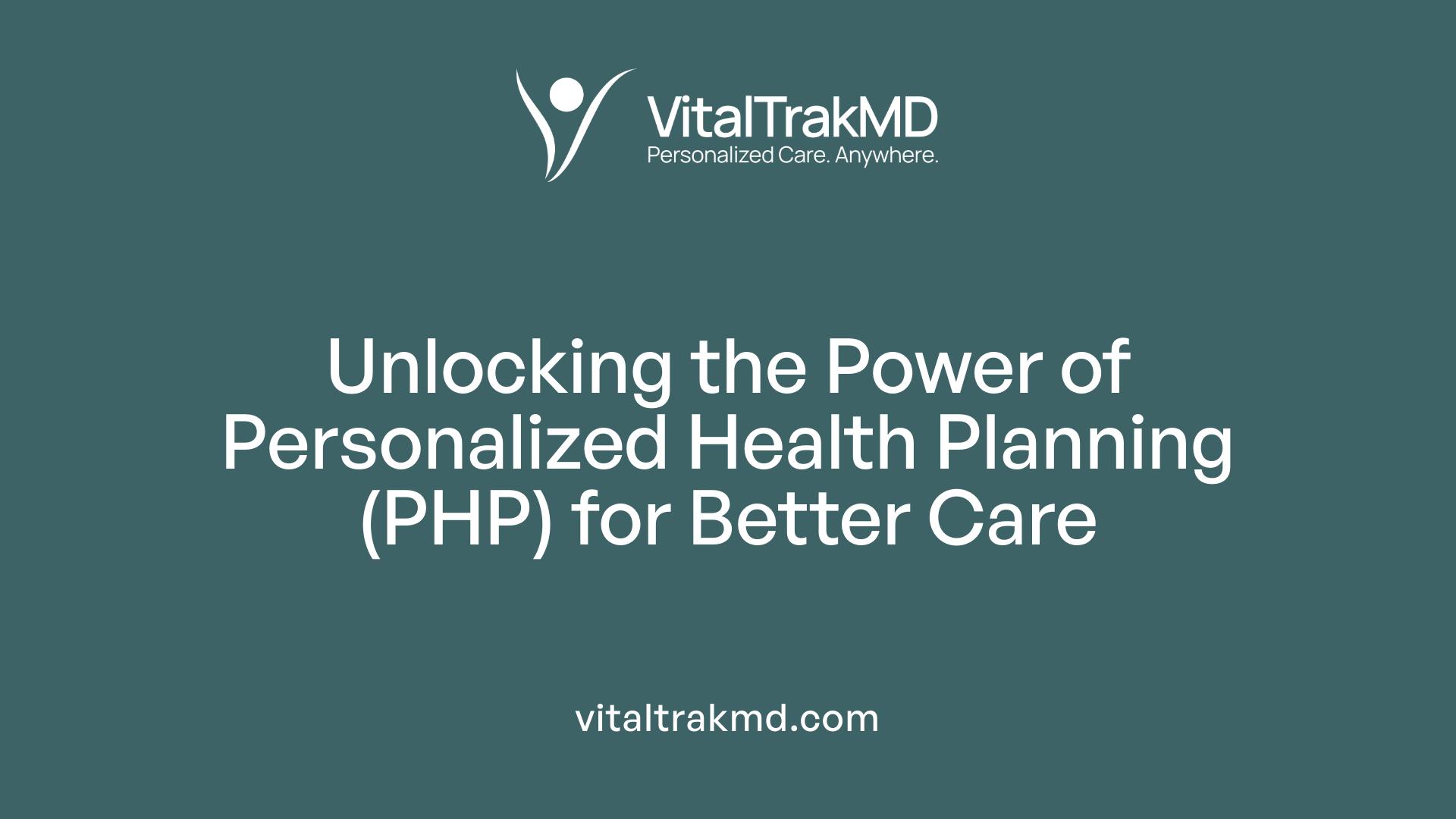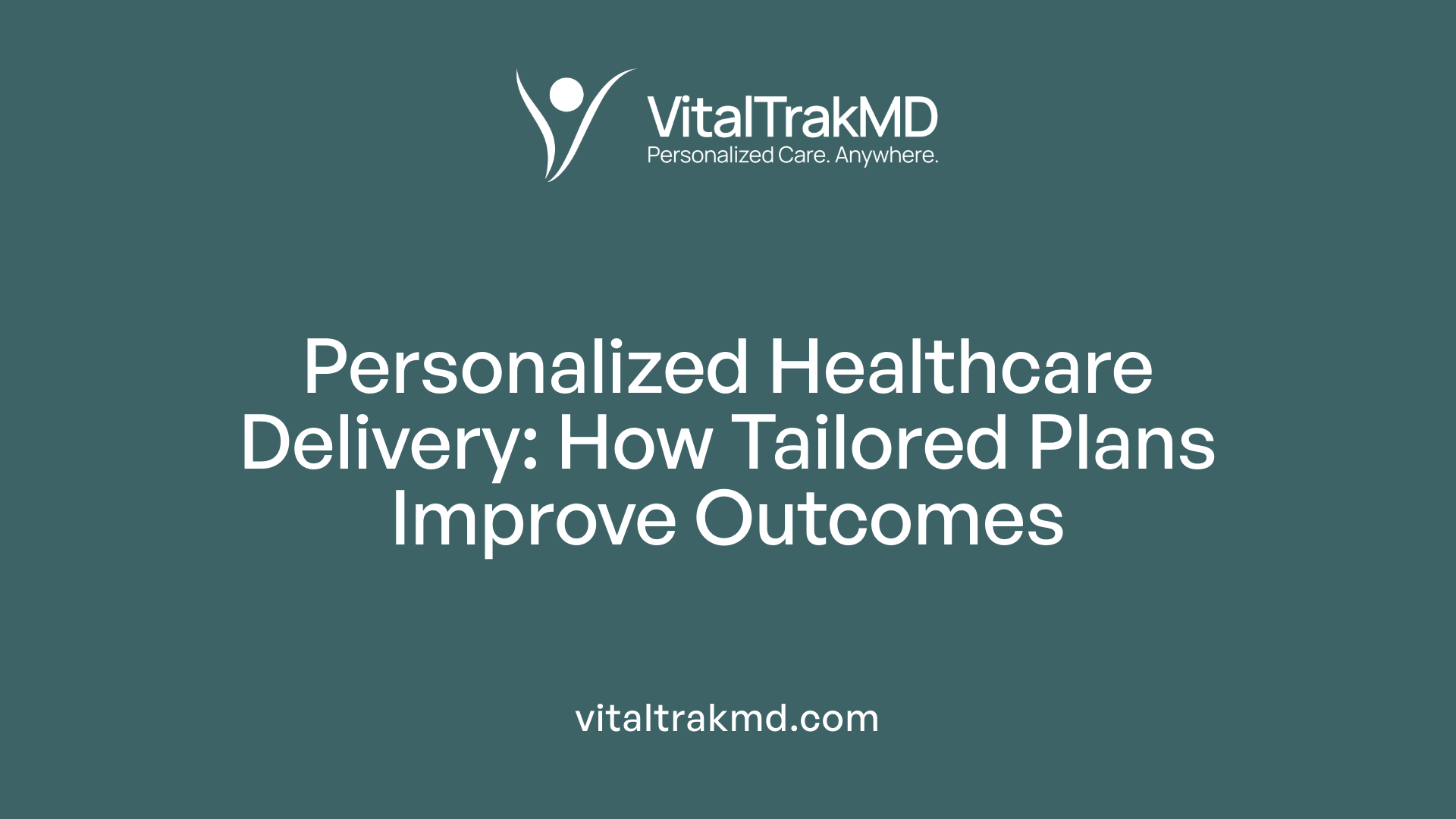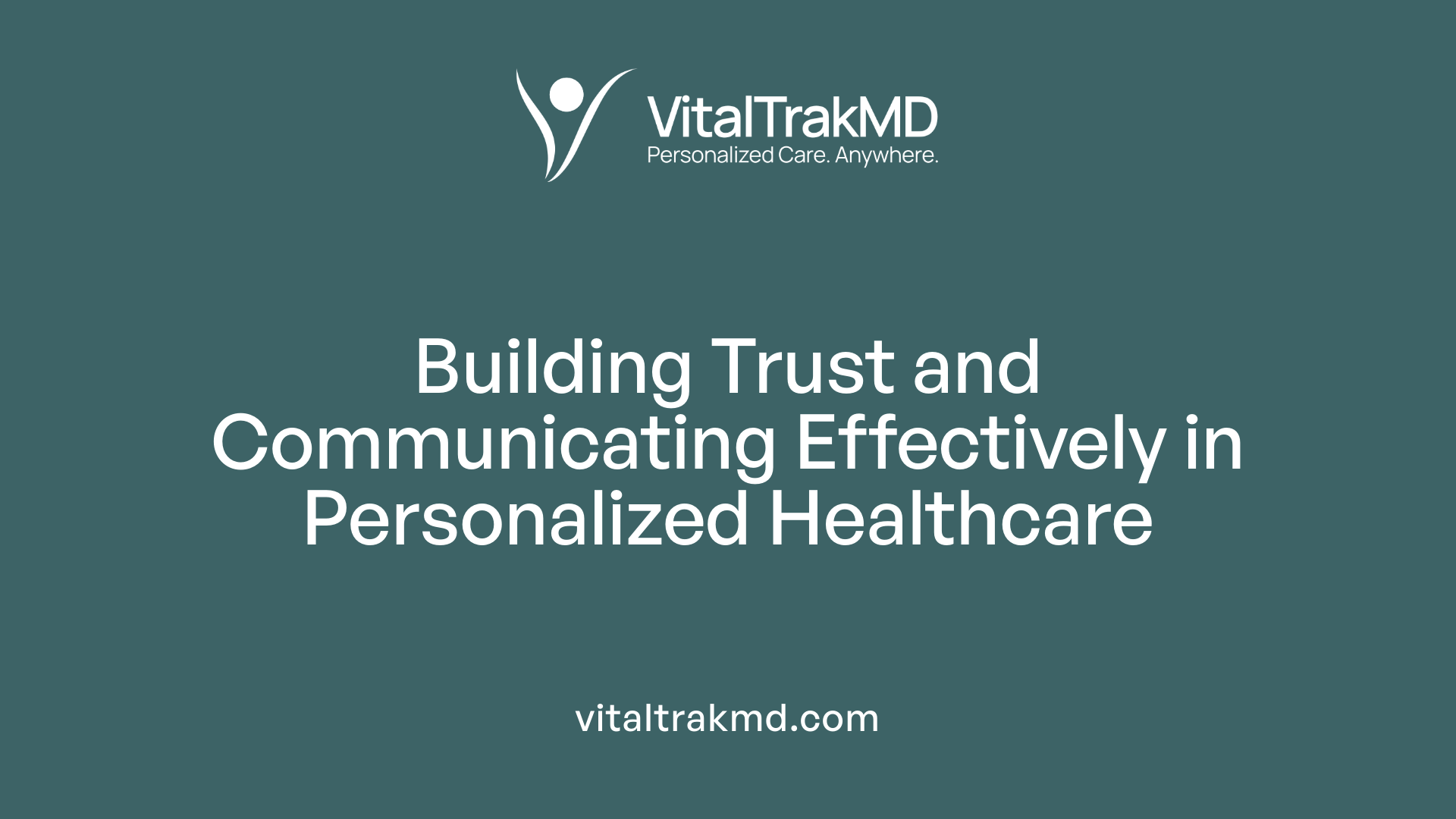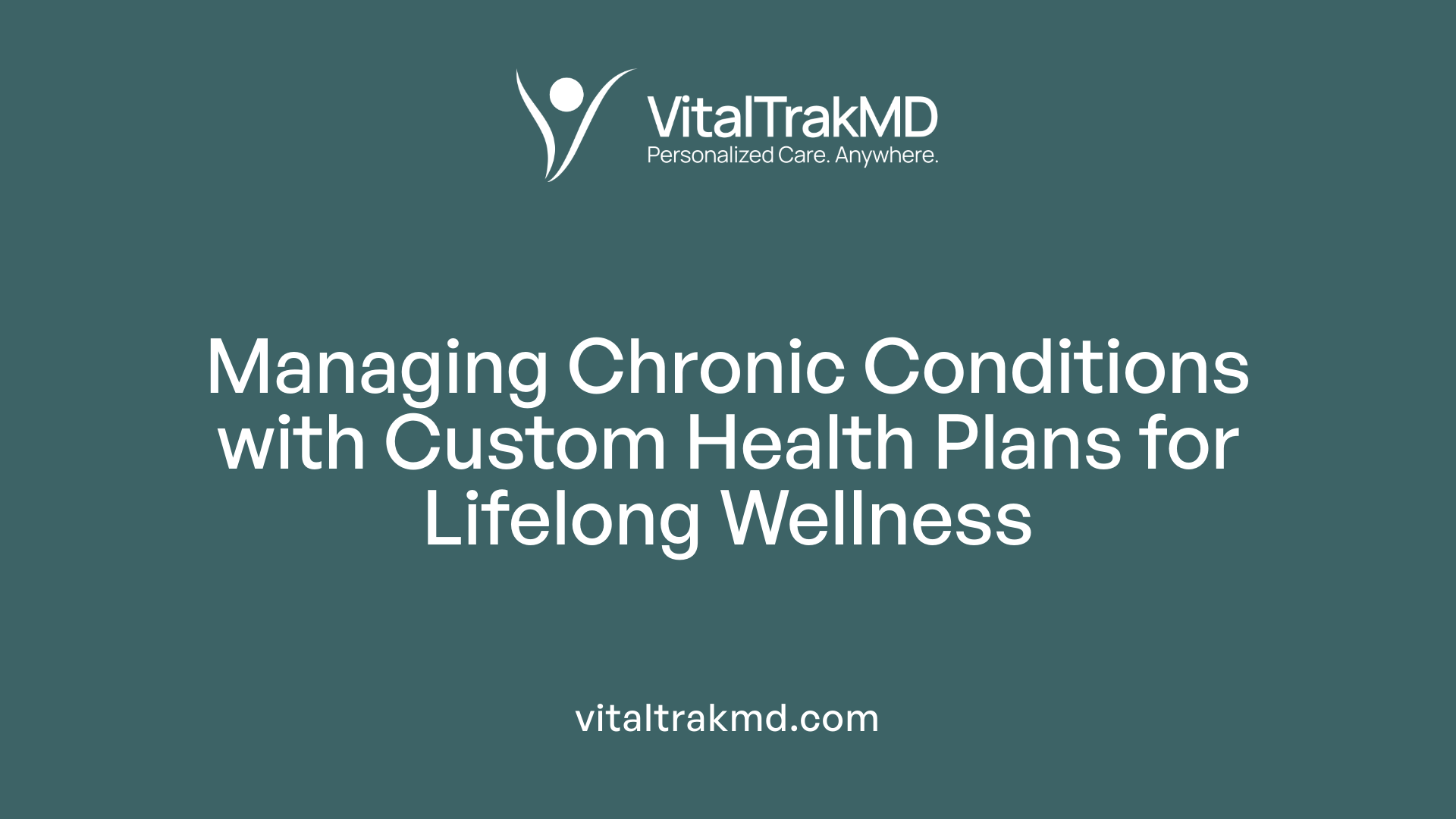Building Confidence in Health Decisions Through Personalized Plans

Empowering Patients Through Personalized Healthcare
In an era where healthcare is rapidly evolving, personalization stands out as a pivotal approach to enhancing patient confidence, engagement, and satisfaction. Building trust and enabling informed decisions require tailored strategies that consider individual health histories, preferences, and sociocultural contexts. This article explores how personalized health plans serve as a cornerstone for confident health decision-making, supported by innovative tools, effective communication practices, and comprehensive evaluation frameworks.
Understanding Personalized Health Planning (PHP) and Its Significance

What is Personalized Health Planning (PHP)?
Personalized Health Planning, or PHP, is an innovative approach in healthcare that emphasizes tailoring care to each individual’s unique needs, preferences, and life goals. It moves away from a one-size-fits-all model, instead creating a customized roadmap aimed at proactive and patient-centered care.
What are the components of PHP?
The process of PHP begins with a comprehensive health risk assessment (HRA), which includes physical exams, family history review, diagnostic testing, and biometric data collection. Patients also perform a whole health self-assessment, helping them identify how health influences their life’s purpose and motivating behavioral change.
Clinicians then collaborate with patients to establish shared healthcare goals based on assessments and personal values. The resulting personalized health plan (PHP) incorporates specific goals, a therapeutic and wellness strategy, clear metrics for tracking progress, referrals to specialists as needed, and a timeline for achieving milestones.
How does PHP encourage proactive, patient-centered care?
Integrating PHP into regular clinical workflows enhances patient engagement and strengthens healthcare relationships. It promotes understanding, confidence, and active participation, which can lead to better health outcomes. Pilot studies, such as those within the Veterans Health Administration, indicate high patient satisfaction and improvements in controlling conditions like weight, blood pressure, and blood sugar levels.
Furthermore, PHP supports the use of data analytics, digital tools, and telehealth to adapt care plans over time, ensuring they remain relevant and effective. By focusing on patients’ intrinsic motivation and values, this approach fosters trust and encourages adherence, ultimately making healthcare more proactive and personalized.
The Process and Impact of Personalization in Healthcare Delivery

How are initial health assessments conducted in personalized health planning?
The foundation of personalized health planning begins with comprehensive assessments. This includes physical examinations, a review of family medical history, diagnostic testing, and collection of biometric data such as blood pressure, cholesterol levels, and weight. These evaluations allow clinicians to understand a patient’s overall health status, identify potential risks, and tailor interventions accordingly.
How does patient involvement through self-assessment influence health planning?
Patients are encouraged to perform a whole health self-assessment, reflecting on how health impacts their life’s purpose and motivation for behavioral changes. This self-awareness helps determine what truly matters to them, fostering intrinsic motivation. When patients recognize their personal goals and values, they become more engaged and committed to their health journey.
How do clinicians and patients collaborate on setting healthcare goals?
Based on clinical assessments and the patient’s self-assessment, healthcare providers work side-by-side with patients to establish shared healthcare goals. This collaboration results in a personalized health plan that includes specific, measurable objectives, therapeutic and wellness strategies, a timeline for actions, and metrics to track progress. Such involvement enhances the patient’s sense of ownership and confidence.
How is personalized health planning embedded into clinical workflows?
Integrating PHP into everyday clinical routines involves training staff, utilizing digital tools, and creating systematic processes for ongoing review and adjustment of care plans. This seamless embedding fosters consistent engagement, improves communication between providers and patients, and ensures personalized strategies are sustained over time.
What are the impacts of personalized health planning on patient engagement and clinical outcomes?
Pilot studies within the Veterans Health Administration (VHA) demonstrate high patient satisfaction, stronger clinician-patient relationships, and positive clinical results such as weight loss, blood pressure control, and reductions in hemoglobin A1c levels. By emphasizing patients' values and inherent motivation, this approach boosts adherence, confidence, and overall health.
Why is personalization important for building trust and encouraging patient participation?
Personalized care focuses on understanding individuals’ unique motivations, cultural backgrounds, and health priorities. This tailored approach fosters trust, makes patients feel valued and understood, and encourages them to participate actively in their health decisions. When patients see their needs and preferences explicitly acknowledged, they are more likely to adhere to prescribed plans.
How adaptable is personalized health planning across different healthcare settings?
This model is designed to fit various environments, including primary care, specialty clinics, telehealth, and home-based care. Its flexibility allows healthcare providers to deliver consistent, patient-centric services regardless of setting, improving accessibility and continuity of care.
What are the future directions for research and implementation?
Further studies are recommended to quantify the clinical, cost-effectiveness, and satisfaction benefits of PHPs. Developing refined tools, workflows, and evaluation systems will help broader adoption. This ongoing research aims to optimize personalization strategies, improve health outcomes, and reduce disparities.
| Aspect of Personalization | Implementation Strategy | Expected Impact | Additional Notes |
|---|---|---|---|
| Initial assessment | Comprehensive evaluations including physical, family, diagnostics, biometric data | Tailored care strategies | Sets a detailed understanding of patient health |
| Patient involvement | Self-assessment of health values and life purpose | Increased motivation and engagement | Empowers patients to participate actively |
| Goal setting | Shared development of health goals based on assessments | Improved adherence and satisfaction | Builds trust through collaboration |
| Workflow integration | Embedding PHP into clinical routines with digital tools | Better care consistency and follow-up | Supports sustainable practice |
| Outcomes measurement | Tracking metrics like weight, BP, HbA1c | Better health control and clinical results | Provides feedback for plan adjustments |
Trust and Communication in Personalized Care
 Building trust and effective communication are fundamental components of successful personalized health plans (PHP). Integrating these elements into patient care involves a combination of strategies aimed at fostering transparency, cultural understanding, and empathetic dialogue.
Building trust and effective communication are fundamental components of successful personalized health plans (PHP). Integrating these elements into patient care involves a combination of strategies aimed at fostering transparency, cultural understanding, and empathetic dialogue.
One effective approach is ensuring healthcare providers engage in honest, open conversations. This transparency helps patients feel respected and valued, creating a safe environment for sharing concerns and preferences. Cultural competence is also vital; providers should be trained to be sensitive to diverse backgrounds, beliefs, and health literacy levels. Active listening helps personalize communication further, allowing providers to tailor their discussions and educational materials to individual patient needs.
Consistent, reliable interactions reinforce trust over time. When patients experience dependable communication and see their healthcare providers genuinely invested in their well-being, they are more likely to adhere to treatment plans and participate actively in their care.
Shared decision-making is another critical aspect. By involving patients in setting healthcare goals and treatment strategies, physicians empower individuals to take ownership of their health journey. This collaborative approach enhances confidence, improves satisfaction, and promotes adherence to health recommendations.
Supporting these efforts are targeted communication skills training programs for clinicians. Such training includes modules on cultural sensitivity, motivational interviewing, and delivering complex medical information in accessible terms. Healthcare organizations can further bolster trust by providing tailored patient education materials that reflect diverse backgrounds, language preferences, and health literacy levels.
To maintain long-term trust, ongoing feedback and positive reinforcement are essential. When providers demonstrate genuine concern and follow through on promises, patients develop a stronger sense of partnership and safety.
In conclusion, embedding trust-building and effective communication into personalized health plans fosters stronger relationships, enhances patient engagement, and ultimately leads to better health outcomes. Organizations committed to these principles create a healthcare environment where every individual feels heard, respected, and confidently supported in managing their health.
Evaluation Tools and Frameworks for Personalized Healthcare Systems
What frameworks and tools are used to evaluate and develop personalized healthcare systems?
The assessment of personalized healthcare systems involves various structured models and evaluation frameworks. One comprehensive approach is based on systematic reviews utilizing PRISMA guidelines. Such models evaluate 11 critical domains and 37 components, assessing their implementation status in health policy, data management, ethical considerations, and infrastructure readiness. This broad assessment helps identify gaps and strengths in existing systems.
To quantify progress, researchers employ scoring systems that assign scores of 0, 1, or 2 to individual benchmarks. These scores enable both qualitative insights and quantitative benchmarking, providing a clear picture of how well organizations are integrating personalized medicine (PM). These models facilitate comparisons across different healthcare settings and highlight areas needing focused improvement.
In specific contexts such as U.S. healthcare, multi-criteria frameworks analyze clinical areas—including oncology and pharmacogenomics—by reviewing data collection, sharing practices, leadership support, and funding allocation. These criteria help gauge the extent of personalized care adoption and tech integration.
Measurement tools also include patient-reported outcome measures (PROMs) and performance-based metrics, which offer direct insights into patient experiences and clinical effectiveness. Organizational factors like leadership quality, data infrastructure, and inter-system sharing are also evaluated to understand how conducive they are for personalized healthcare deployment.
When it comes to healthcare AI applications, particularly chatbots or decision support tools, evaluation focuses on metrics such as accuracy, trustworthiness, empathy, and safety. These criteria ensure that AI systems provide reliable, ethical, and person-centered support, matching the needs of individuals in diverse healthcare settings.
Overall, these frameworks and tools serve to guide continuous improvement, ensuring that personalized healthcare systems are safe, effective, and aligned with patient and provider needs.
Supporting Chronic Disease and Complex Condition Management with Personalized Plans

How are personalized health plans used to manage chronic illnesses, aging, and other medical conditions?
Personalized health plans (PHPs) are essential tools for managing chronic conditions such as diabetes, asthma, and heart disease. These plans focus on creating tailored prevention, diagnosis, and treatment strategies that are specifically designed around an individual's genetic makeup, lifestyle choices, and environmental factors.
In practice, healthcare providers collaborate closely with patients to develop shared goals and a custom plan of action. This includes continuous self-assessment, setting realistic health objectives, and choosing interventions that align with the patient’s personal values and daily routines. For example, a diabetes management plan may incorporate personalized diet, exercise routines, and medication schedules, all monitored and adjusted based on biometric data.
A core feature of these plans is their proactive nature. They leverage advanced predictive technologies and comprehensive risk assessments to identify health risks early. This shift allows healthcare to move from merely reacting to health issues as they arise to preventing them altogether.
Technologies such as predictive analytics analyze data from diagnostic tests, biometric data, and family history to forecast potential health issues. This enables early, targeted interventions that can prevent disease progression or reduce complications.
Enhancing self-management, these plans foster a partnership between patients and clinicians. By involving patients in their care decisions and providing personalized education, patients are empowered to better understand and manage their conditions.
Overall, personalized health plans are transformative in managing complex health conditions. They improve health outcomes, enhance quality of life, and enable patients to take an active role in their health journey, especially as they age and face additional medical challenges.
Technological Innovations Supporting Personalization
Technological advancements are transforming personalized healthcare by enabling more tailored, efficient, and secure care delivery. Among these innovations, artificial intelligence (AI) and machine learning are at the forefront. They analyze vast amounts of health data—such as genetic information, electronic health records, and real-time biometric data—to facilitate detailed risk assessments and develop individualized treatment plans.
AI-driven tools enhance diagnostic accuracy, predict disease progression, and suggest optimal interventions, ultimately improving health outcomes. For example, predictive analytics can identify patients at higher risk for certain conditions, allowing earlier intervention.
Telemedicine, virtual health assistants, and mobile health apps further support personalized care by providing accessible, continuous engagement outside traditional clinical settings. These technologies allow patients to receive tailored health advice, monitor their health status, and communicate conveniently with healthcare providers.
Emerging technologies like blockchain, Internet of Things (IoT), and advanced imaging are shaping the future of personalized care. Blockchain ensures secure management of sensitive health data, fostering trust and enabling seamless data sharing between providers and patients. IoT devices, such as wearable health monitors, offer real-time data collection, enhancing ongoing health management.
Additionally, tools like virtual reality (VR) and predictive analytics provide immersive patient education and anticipatory insights, supporting better understanding and proactive health behavior. VR can simulate health scenarios for education or therapy, while predictive models anticipate health risks, guiding personalized prevention strategies.
In summary, these innovations create a healthcare ecosystem that is more responsive to individual needs. They allow clinicians to craft precise, data-driven decisions and empower patients with accessible, personalized tools—making healthcare more effective, patient-centered, and adaptive to each person's unique health journey.
Summarizing the Future of Personalized Healthcare and Confidence Building

What are the future prospects for personalized healthcare in building patient confidence?
The future of personalized healthcare looks promising, with ongoing innovations and technology integration playing a crucial role. Advances in AI, predictive analytics, and digital health tools will support a more tailored and transparent approach to patient care. Patients will likely have greater access to their health information through secure platforms, such as blockchain, which enhance trust and data security.
Emerging trends are also expanding personalized care beyond clinical data to include social determinants of health, addressing factors like socioeconomic status and community resources. This inclusive approach aims to improve health equity and ensure all populations benefit from personalized strategies.
Healthcare providers are encouraged to stay flexible and adopt new models that prioritize patient involvement, trust, and loyalty. These developments are expected to foster confidence, make care more proactive, and enhance overall health outcomes.
As a result, the healthcare landscape is shifting toward a more confident, empowered, and inclusive system where patients actively collaborate in managing their health, supported by innovative technologies and personalized, data-driven insights.
| Future Aspects | Description | Expected Impact |
|---|---|---|
| Advanced AI & Analytics | Use of AI tools for proactive health management | Increased accuracy and personalization |
| Digital Platforms & Blockchain | Secure sharing of health data | Enhanced trust, privacy, and data ownership |
| Expanded Personalization | Incorporating social and community data | Broader health equity and tailored interventions |
| Patient Control & Access | Greater involvement in health decisions | Higher confidence and engagement |
| Innovation & Adaptability | Embracing emerging care models | Trust-building and improved loyalty |
This evolving landscape aims to transform healthcare into a more transparent, accessible, and patient-centric system, ultimately boosting confidence at all levels of care.
Building Confidence Through Personalized Healthcare Innovation
Personalized health plans are redefining the landscape of healthcare by fostering trust, engagement, and confidence among patients. Through comprehensive assessments, collaborative goal-setting, and cutting-edge teknologi, these plans ensure that care is tailored, proactive, and aligned with individual values and needs. Effective communication, trust-building strategies, and robust evaluation frameworks support the scalable integration of personalized care into diverse healthcare settings. As technological innovations and research continue to evolve, the future promises even greater personalization, transparency, and patient empowerment. Healthcare systems that embrace these strategies will not only improve health outcomes but also cultivate a more confident, engaged, and satisfied patient population, ultimately transforming healthcare into a more effective and compassionate paradigm.
References
- Personalized Health Planning in Primary Care Settings - PMC
- [PDF] Building trust through personalized member engagement - AWS
- Improving personalised care, through the development of a service ...
- How to Become a Confident Medical Decision Maker for Someone ...
- Can care management build member trust in healthcare and health ...
- Empowering Patients Through Personalized Care Plans
- Personalized Wellness Plans: How to Tailor Your Health Journey
Recent articles
Want to Feel Better and Live Healthier?
Join hundreds of patients taking control of their health with personalized care that fits their life – not the other way around.
Rated 4.8/5 by 32+ customers







